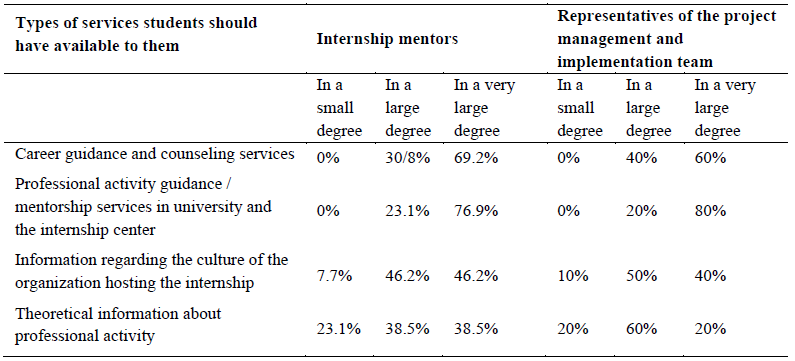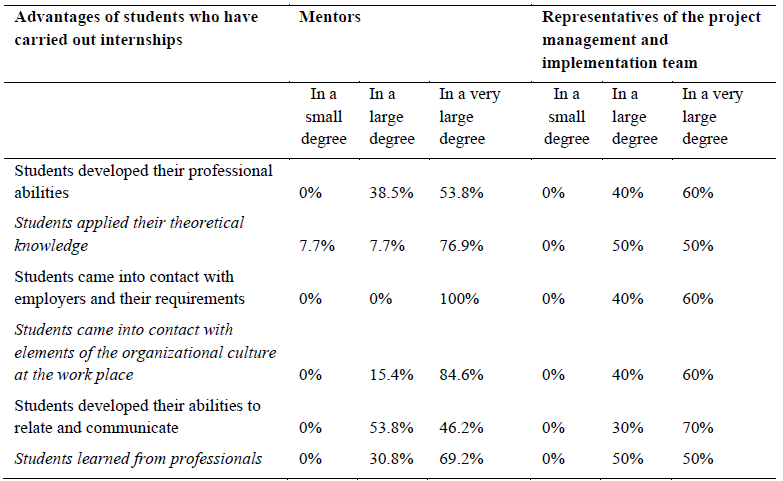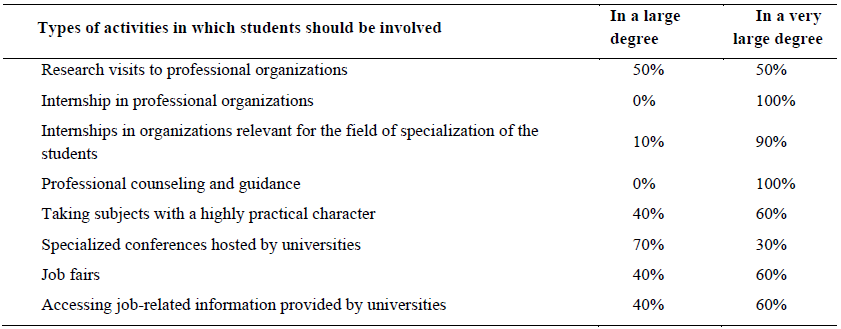Abstract
Entry into the labor market of higher education graduates is a major concern both for universities and graduates, but especially for organizations coordinating domestic and international education policies. The European Commission supports education reform structural policies, particularly at university level, that ensure the professionalization of graduates, the development of occupational competences as well as transversal competences with a view to enhancing, developing and capitalizing on their potential. In this context, universities supplement their student offers not only with educational services but with counseling as well as orientation services that help students manage their potential and define their educational and career path. This paper analyzes a positive experience within the project “
Keywords: Employabilityinsertion on professional and social lifecareer counselling
Introduction
Faced with a heightened dynamic of the labor market as well as with major financial pressure,
universities are required to make great efforts in order to tailor their educational offer to labor market
requirements to train graduates so they can handle the challenges of the social and economic
environment.
As such, universities are the link between the labor market, defined as the economic space where
the demand for labor force, represented by employers and supply, is freely met, confronted and
negotiated, and the demand, represented by those who are in possession of the labor force, in this case
university graduates (Suciu, Lacatus, 2013). However, the insertion into the labor market and the
graduates’ social and professional integration represent problems for the employing organizations and the
young graduates as well as for central authorities, which have a pivotal role in defining national policies.
Organizations are continuously preoccupied with the different stages of the professional socialization
process, with guiding new employees in their field (from recruitment all the way to effective integration),
as well as with the performances of new employees, in the shortest timeframe. But social and professional
integration is a complex, personalized process of an individual’s adaptation to the social and professional
environment, the requirements of the workplace and the behavior required by the organization where he
or she works, and adapting his or her personality to that of the professional group. Employer requirements
target an optimal combination between professional competences and transversal ones, which ensure
professional activities are carried out with efficiency.
Increasingly, a significant number of young people abandon their studies and, with it, the
possibility of obtaining an adequate level of qualification, which creates serious difficulties with job
market integration. Precisely in order to curb this phenomenon, universities have initiated complex
practical and theoretical training services and psycho-pedagogical counseling and guidance services for
students. The European Commission advises educational reform, in particular at the level of higher
education, in such a way as to help students develop professional and transversal competences and
capitalize on their potential. The Bologna declaration shows that employability, expressed as the capacity
of an individual to find and maintain a place of work, to maintain an adequate dynamic on the labor
market, is crucial for higher education, which has the role of helping students develop the abilities and
competences required by employers and the labor market.
In the context of this document and the situations presented, we are of the opinion that, in the long
term, individual efforts by educational institutions can no longer provide the intended results. For this
reason, it is necessary to define and adopt new coherent policies on the topic of the employability and
flexibility on the labor market of fresh graduates, which incorporate the examples of good practice,
disseminate and multiply them accordingly, all correlated in a tridimensional approach based on cost,
time and performance. The synergy of the joint efforts of educational institutions, public representation
and financing bodies, students / graduates as well as the business world must be constantly directed
towards capitalizing on the potential of all those involved, in the context of national and international
opportunities.
Local, regional and national development cannot be accomplished, in the corresponding terms of
effects and efforts, without the contribution of universities, that allows on the one hand the transmission of essential information to young people, the introduction and promotion of the effects of innovation, the
creation of the necessary climate and material conditions for research and innovation, the promotion of
performant educational services, as the base for all socio-economic activities (Peptenatu et al, 2012).
Problem statement
The project “
the Bucharest University of Economic Studies, the Romanian Management Consultants’ Association, The
Consultancy Group for Development Company and the IT&C Students and Professionals’ Association,
has set as its main goal to facilitate the transition from schooling to active life for 353 graduate students
from economics programs, by offering complex services consisting of guidance, counseling, professional
development, career mentoring and internships with potential employers. In this way, the students
received the support needed for effective decision-making regarding their professional and educational
trajectory, to develop their professional aptitudes and adopt appropriate attitudes towards work.
Taking into account the premise that universities need to be open towards partnerships in order to
provide services adapted both to students and to the labor market, the project created a management
internship community by involving the university, professional associations, NGOs, employers, mentors
and interns. The quality of the internships was ensured by selecting partners based on the organizations’
interest and availability in providing internships, and the profile of the organizations correlated with that
of the respective students.
The project tackled a vital issue for economics graduates, namely their employability in their field
of study. The project matched the students with the internships based on the correlation between each
student’s profile, interests and aptitudes, defined through the guidance and counseling activities, and the
offer from the organizations, considered internships centers. Throughout the implementation of the
project, the students were monitored and assessed by project specialists and mentors. Through the
complex guidance and counselling services offered (personal profile development, educational trajectory,
career plan) and the counseling support activities (workshops for the development of personal abilities),
internships, the project addressed the causes which affect students’ ability to integrate into the labor
market, including starting and managing their own career: lack of vision regarding the professional
environment, lack of motivation and perspective for studying and working, insufficient self-knowledge
etc. (Richiteanu - Nastase, 2009).
Research questions
Through the research carried out and outlined in the present article, we set out to highlight the
existence of a direct dependence between the number of students who benefited from information,
guidance, counseling and professional development services suited to their needs and the number of
students who developed personal decision-making abilities regarding their professional and educational
trajectory.
Moreover, a second line of research focused on establishing the correlation between the
complexity of the information, guidance and counseling services as well as that of the internships and
facilitating the transition from an educational setting to active professional life, reflected in the employment duration and the correspondence between the field of work and the field of study of the
students.
Purpose of a study
In accordance with the directions of study established, through our research we undertook to
highlight the importance that the complex services offered by the project (provision of information,
guidance and counseling, monitoring during internships) had in facilitating the social and professional
insertion of the project beneficiaries and in developing the beneficiaries’ ability to find and adapt to the
work place.
Research methods
To assess the impact of the internships and information, guidance and counseling activities on the
performances of the students taking part in the „Practică azi pentru a deveni managerul de mâine!”
project, an
the reality being studied through the use of a questionnaire-based survey. The survey was carried out
among those involved in the project: graduate students of the Bucharest University of Economic Studies
(358 beneficiary students, of which 200 did internships), the representatives of the management and
implementation team of the applicant and project partners (15 representatives of the management and
implementation team who are responsible for the professional development of the beneficiary students
and for providing them with information, coordination, guidance and counseling), mentors (designated
individuals) from the organizations where students carried out internships (90 mentors from the internship
centers). The questionnaires were answered by 92 students, 10 team representatives and 13 mentors. The
sampling methods used were:
questionnaires, which allow for the collection of a large number of data at a low cost, were applied
between September 20 – October 10, 2015 to the 3 groups studied. The questionnaires were applied
directly, online and self-administered, with the help of electronic instruments created on the google-drive
platform; they were emailed to all the participants of the 3 groups studied, the contact data being available
in the project database.
Findings
The surveyed students felt they had benefitted from complex services within the project, as
follows: individual and group counseling services (79.3%), internships (83.7%), best practices workshops
(45.7%), information from various sources – leaflets, posters, sites, guides (56.5%), information from
faculty (70.7%). Most of the surveyed students feel that career guidance and counselling services are
beneficial for them (94.6%) and helped them know themselves better, raised their motivation to enter the
labor market, stimulated their capacity to project and plan their career and helped them identify
professional alternatives.
The opinions of internship mentors (potential employers) and the project team representatives
regarding the services students should have available to them in order to make a more successful
transition from a school setting to professional life have been centralized in Table 1.


The similarity in results for the two respondent categories shows a unitary perception regarding
the services that universities have to provide to students: guidance, counseling, consultation for a
successful insertion on the labor market. The aspects related to familiarizing himself or herself with the
working environment, knowing the culture of an organization must not be ignored as decisive factors of
insertion. We are of the opinion that students, the future employees, must become aware of this aspect to
adequately decipher both the visible culture of an organization, as well as, more importantly, the informal
culture which would make their integration in professional organizations easier. (Coulon, 1993).
With regard to the internship, the surveyed students stated that a number of their expectations were
confirmed: they carried out an internship in an organization/department in line with their field of study
(70.7% in a large degree or a very large degree), they were informed of the expectations related to the
given an introduction on the organization, the internship center (76.1%), they were guided by a member
they carried out professional activities in line with their field of specialty (68,5% in a large degree or a
very large degree), theyput into practice the theoretical knowledge accumulated (63% in a large degree
or a very large degree), they were given explanations regarding where they were wrong and why (64.1%
in a large degree or a very large degree), they developed their professional abilities (65.2%),
into direct contact with the employers and their requirements (62% in a large degree or a very large
degree),
and they have found or will find a place of work more easily (63% in a large degree or a very large
degree).
Table 2 centralizes the advantages of carrying out internships in organizations, as seen by the
mentors and representatives of the project management and implementation team.

The results show shared opinions towards the benefits of internships, both from students, as well
as from those who coordinated and monitored them: the development of professional abilities, the
development of transversal communication and career management abilities.
The research carried out and the statistical processing of gathered data show an interdependence
between the number of students who benefited from information, guidance, counseling and professional
development services and the number of students who developed personal decision-making abilities
regarding their professional and educational trajectory. Out of the 92 students surveyed, 40 were
employed in their field of study (53.3%), 31 were employed in a field oher than their field of study
(33.7%), 16 were currently searching for a place of work (17.4%). Another positive outcome of the
research is the fact that 26 (36.1%) of the respondents were at the time employed with the company /
organization which had hosted them as interns.
The services provided by the project have a positive impact, as can be seen from the elevated rate
of employability registered at the end of the project: out of the 200 students who did an internship, 71
found a place of work (35.5%).
The correspondence between the complexity of the information, guidance, counseling services and
internships on the one hand, and the facilitation of the transition from a school environment to an active
professional life on the other hand, was reflected in the time dedicated to finding a place of work, the
strategies used for this purpose as well as securing employment according to their qualification. A large
number of the employed students surveyed declared that they had found a place of work within 3 months
of beginning to search for one (42.5% spent less than a month searching for a place of work, 28.8% less
than 3 months). An analysis of the employability field revealed that the largest number are the employees
who hold economic and financial positions (35.06%). The guidance provided as part of the project
offered students solutions to finding a place of work. From a statistical standpoint, 76 (82.6%) of the
surveyed students declared having sent CVs / letters of intent to employers, 67 (73.9%) declared that they
had hiring interviews, 44 (47.8%) consulted dedicated sites, 36 (39.1%) asked for assistance from
acquaintances/ friends, 35 (38%) enlisted in recruitment databases, 23 (25%) participated in hiring
competitions, 11 (12%) consulted the vacancies posted by National Agencies for Employment, 8 (8.7%)
sought the services of a recruitment agency.
We hold the opinion that a decisive factor in the students’ development were the various subjects
provided during group counseling (personal efficiency, effective communication, creativity and creative
problem solving, teamwork, project management, approaching the labor market with a CV and letter of
intent, company culture, career management) and ensuring individual guidance and monitoring for the
students.
The positive impact of the project, as well as the perceptions of those involved, show that the
universities must adapt and customize the offer of complex guidance and counseling services and
internships, to actively support the graduates’ social and professional integration. The project team
representatives considered, during the research carried out, that these services need to be diversified (see
table no. 3).

Conclusion
The results outlined above are part of a complex study and show an example of good practices
which universities can develop in the short and medium term in order to ensure a good level of
sustainability.
universities in order to increase the employability of graduates can take into account the following:
- adopting a flexible curriculum with a higher content of applied activities when considering
lectures/seminars and the curriculum plan;
- training faculty members to offer guidance and counseling to students, to communicate,
cooperate and be orientated towards partnerships;
- motivating the faculty and employers to build partnerships;
- developing complex psycho-pedagogical guidance and counseling services for students;
- disseminating and capitalizing on positive experiences at the level of the academic community
and employers. However, for such initiatives to be implemented, it is necessary to achieve a level of interest
among all involved entities in a joint medium and long term effort. If the first to have a stake in the
process are universities, with a view towards a better integration of graduates, later on the representatives
of the business world become primarily interested in it as a result of having an interest in the quality of
new hires and subsequent specialty training costs.
References
- *** The European Commission/ EACEA/ Eurydice. (2014). Modernization of Higher Education in Europe: Access, Retention and Employability 2014. Luxembourg, the Publications Office of the European Union.
- *** The European Commission. (2013). Communication from the Commission to the European Parliament, the Council, the European Economic and Social Committee and the Committee of the Regions. Europe's higher education systems. Brussels.
- *** The Bologna Declaration. (1999). Retrieved February 20, 2016, from http://www.magna-charta.org/resources/files/text-of-the-bologna-declaration Coulon, Alain, (1993). "Ethnométhodologie et education", Paris, Presses Universitaires de France Peptanatu, D., Draghici, C., Merciu, C. (2012). Characteristics of entrepreneurial profile in some emergent territorial structures in Romania.Actual Problems of Economics/Aktual'ni Problemi Ekonomìki 138 (12), 448 – 458.
- Richiţeanu-Năstase, Ramona, (2009).Consilierea pentru carieră a studenţilor. Harta personală a carierei. în Direcţii şi strategii moderne de formare şi perfecţionare în domeniul resurselor umane, University Politehnica of Bucharest Suciu, Marta-Christina; Lacatus, Maria Liana, (2013). New institutional design in higher education systems in emerging and developing countries (EDC), New challenges and features for universities, in International Conference Current Economic Trends in Emerging and Developing Countries(EDC), TIMTED-2013 volume, June 6-8 2013, Universitatea de Vest Timisoara, details in Final Programme TIMTED 2013 update.pdf/session: Development and emerging countries topics
Copyright information

This work is licensed under a Creative Commons Attribution-NonCommercial-NoDerivatives 4.0 International License.
About this article
Publication Date
25 May 2017
Article Doi
eBook ISBN
978-1-80296-022-8
Publisher
Future Academy
Volume
23
Print ISBN (optional)
-
Edition Number
1st Edition
Pages
1-2032
Subjects
Educational strategies, educational policy, organization of education, management of education, teacher, teacher training
Cite this article as:
Staiculescu, C., & Dobrea, R. C. (2017). Impact of the Career Counseling Services on Employability. In E. Soare, & C. Langa (Eds.), Education Facing Contemporary World Issues, vol 23. European Proceedings of Social and Behavioural Sciences (pp. 938-945). Future Academy. https://doi.org/10.15405/epsbs.2017.05.02.115

